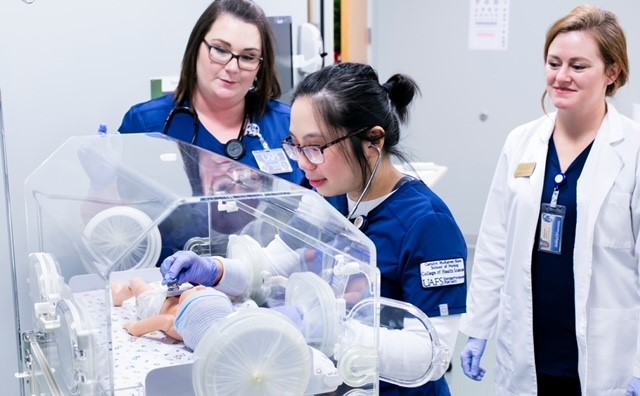
Progressive simulation helps students learn critical nursing skills.
Nurses Tackle Tough Problem of Maternal Mortality in Arkansas
Although it’s not a race you want to finish first, Arkansas has the highest rate of maternal mortality in the country.
However, 91 percent of the deaths are preventable, according to the Arkansas Maternal Mortality Review Committee 2022 Legislative Report.
The nursing faculty at the University of Arkansas - Fort Smith is working to prepare new nurses for the complications they may face in their practice and the practical changes they may make to improve birth outcomes for mothers.
Earlier this semester, members of the Carolyn McKelvey Moore School of Nursing faculty – senior instructors Tresia Rouse and Brooke Gray, who is also director of the associate degree of nursing; and Dr. Tammy Rogers, assistant professor, and Dr. Patti Conard, associate professor – presented a report on how the team uses progressive simulation to help nursing students who may serve in obstetrics. The team presented at the National League of Nursing Education Summit in San Antonio, Texas. The summit brings together nurse educators from around the world to explore trending and emerging topics in nursing education.
The simulation focuses on a labor complication where a baby’s shoulder is stuck on the mother’s pubic bone, a complication that can increase the risk of postpartum hemorrhage. Postpartum hemorrhage is a leading cause of death for new mothers. Additionally, the simulation progresses to a postpartum hemorrhage in which another key component was to focus on the priority nursing interventions for these complications.
“We investigated whether prelicensure students could develop critical clinical judgment skills through a progressive simulation,” Rouse said. “The results were remarkable, demonstrating student’s application of clinical judgment skills.”
The research highlighted students’ growing command of essential skills like recognizing cues, analyzing data, taking action, and evaluating outcomes.
“Progressive simulation is not just an innovative teaching approach; it is essential for developing the clinical judgment skills that future nurses need,” Rouse said.
Rouse said the nursing faculty believes this training will directly “impact the care that maternal clients receive.”
“By providing nursing students interested in maternal health with essential skills and confidence, this innovative simulation prepares them to effectively tackle urgent issues in maternal health should they encounter such clinical situations,” she said.
